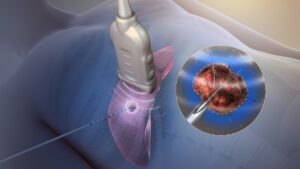In the world of modern medicine, advancements in treatment techniques are revolutionizing the way healthcare providers manage various conditions. One such innovative method is Radiofrequency Ablation (RFA), a minimally invasive procedure that has gained popularity for its effectiveness in treating a wide range of medical issues. From chronic pain management to treating certain types of cancer, RFA is making waves in the medical field.
What is Radiofrequency Ablation (RFA)?
Radiofrequency Ablation (RFA) is a medical procedure that uses high-frequency electrical currents to generate heat, which is then used to destroy abnormal tissue. The technique is typically used to target and treat tissues that are causing problems, such as tumors, abnormal heart rhythms, or nerve pain.
RFA is most often performed under local anesthesia, and it can be done with the aid of imaging techniques, such as ultrasound, CT scans, or fluoroscopy, to guide the physician and ensure precision. During the procedure, a small needle or catheter is inserted into the target area, and the electrical current is passed through it to heat the tissue, leading to its destruction.

How Does Radiofrequency Ablation Work?
RFA works by delivering controlled heat to a specific area of tissue. The procedure involves the following steps:
- Preparation: The patient is positioned comfortably, and local anesthesia is applied to numb the treatment area. In some cases, sedation may also be used to relax the patient.
- Insertion of the Electrode: A thin, flexible needle or catheter is inserted through the skin and guided into the targeted tissue. This is usually done with the help of imaging techniques, such as ultrasound or CT scans, to ensure accurate placement.
- Heat Delivery: Once the electrode is in place, high-frequency electrical energy is passed through it. This energy creates heat, which destroys the targeted tissue. The heat is typically controlled to avoid damaging surrounding healthy tissues.
- Post-Procedure Care: After the procedure, the patient may be monitored for a short period to ensure there are no immediate complications. Most patients can go home the same day.
Applications of Radiofrequency Ablation
Radiofrequency Ablation has a wide range of applications across different medical specialties. Some of the most common uses include:
- Pain Management: RFA is often used to treat chronic pain, especially in cases involving the spine, joints, or nerves. It is particularly effective for conditions such as facet joint arthritis, sacroiliac joint pain, and trigeminal neuralgia. In these cases, RFA targets specific nerves responsible for transmitting pain signals, providing relief for patients who do not respond well to other treatments.
- Cancer Treatment: RFA is also used to treat certain types of cancer, particularly in cases where tumors are located in hard-to-reach areas or when surgery is not an option. It is most commonly used for liver, kidney, lung, and bone cancers. By destroying the tumor tissue with heat, RFA can help shrink or eliminate the cancerous growth.
- Cardiology: In the field of cardiology, RFA is used to treat abnormal heart rhythms, also known as arrhythmias. For instance, in patients with atrial fibrillation, RFA can be used to isolate the abnormal electrical pathways in the heart, preventing the irregular heartbeats that cause the condition.
- Varicose Veins Treatment: RFA is also used to treat varicose veins, a condition where the veins become swollen and twisted. Using heat to close off the affected veins, RFA helps improve circulation and reduce the appearance of varicose veins.
Benefits of Radiofrequency Ablation
RFA offers numerous advantages over traditional surgical treatments, making it a popular choice for both patients and healthcare providers. Some key benefits include:
- Minimally Invasive: Unlike open surgery, RFA involves small incisions or no incisions at all. This reduces the risk of infection, scarring, and a lengthy recovery period.
- Short Recovery Time: Since RFA is a minimally invasive procedure, patients typically experience less pain and recover faster than with traditional surgery. Many patients can resume normal activities within a few days.
- Targeted Treatment: RFA allows for precise targeting of the abnormal tissue, reducing the risk of damage to surrounding healthy tissues. This makes it especially beneficial for sensitive areas like the heart or liver.
- Effective for Chronic Conditions: For individuals with chronic pain or conditions that have not responded to other treatments, RFA can provide significant relief, improving quality of life.
- Outpatient Procedure: Most RFA procedures can be performed on an outpatient basis, meaning patients can go home the same day, avoiding the need for an extended hospital stay.
Risks and Considerations
While RFA is generally safe, it does come with some risks. These may include:
- Infection: As with any procedure that involves needles or catheters, there is a small risk of infection at the site of insertion.
- Damage to Surrounding Tissues: Although RFA is designed to target specific areas, there is still a small chance that nearby tissues could be unintentionally damaged by the heat.
- Nerve Injury: If the procedure is used to treat nerve-related pain, there is a risk of causing temporary or permanent nerve damage.
- Recurrence of Symptoms: In some cases, the effects of RFA may not be permanent, and symptoms may return over time, necessitating additional treatments.
- Pain or Discomfort: Some patients may experience mild discomfort or soreness following the procedure, though this is usually temporary.
Conclusion
Radiofrequency Ablation (RFA) is a versatile and minimally invasive treatment that offers significant benefits for patients suffering from chronic pain, certain types of cancer, abnormal heart rhythms, and other conditions. By using controlled heat to target and destroy abnormal tissues, RFA can provide relief where other treatments may have failed. Although the procedure carries some risks, it remains a valuable option for many patients, with a relatively quick recovery time and a high success rate.
If you think RFA might be right for you, it’s important to consult with a healthcare provider to discuss your condition, evaluate potential benefits, and address any concerns you may have.
Get in touch with us for further information or book a personalized consultation!
